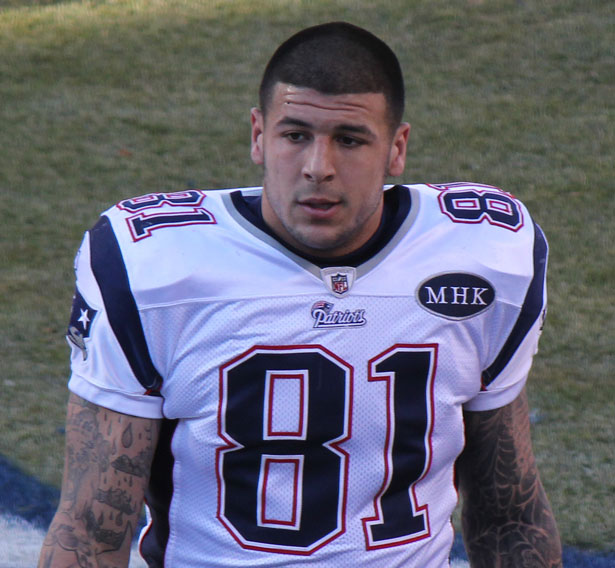
Aaron Hernandez. (Wikimedia Commons/Jeffrey Beall)
Crime hysteria is as American as genetically modified apple pie. Whatever the rates of violent street crime in society, the existential threat of the black/brown youth predator can always be counted upon to repulse and titillate both the mass media and the popular consciousness.* The other all-consuming National Pastime centered on gawking at the black body in a spectrum of violence is the National Football League. Put these two together—crime hysteria and the NFL—and we have what can only be described as a cultural nocturnal emission.
Much ink has been spilled about the twenty-nine—yes twenty-nine (!)—NFL players who have been arrested since the Super Bowl. At the center of all the coverage is former New England Patriots tight end Aaron Hernandez, accused of the premeditated execution of semi-pro football player Odin Lloyd. The details surrounding Lloyd’s murder get more ghastly by the day, but putting Hernandez’s photo at the center of a collage of the other twenty-eight arrested players makes it seem like there is some kind of violent, to quote one site, “NFL Crime Wave.” There is another serious case this off season of undrafted Cleveland Browns rookie Ausar Walcott who was arrested for attempted murder last Wednesday after punching a man outside of a New Jersey club. Outside of that, most of these twenty-nine arrests revolve around domestic disputes, marijuana possession, driving while intoxicated and even “drag racing.” I don’t want to make light about any of these issues (Except for the weed. I shall happily make light of that.) But attempts to create connective tissue between these incredibly disparate cases reeks of a highly racialized hysteria. You don’t have to be Cornel West to see the racial coding in articles like this one by Mark Madden that reads, “The Aaron Hernandez saga is hardly an isolated incident. It’s the latest chapter in pro football’s shameful litany. Gangsta culture perpetrating gangsta acts.”** Then there is NFL Hall of Famer Fran Tarkenton on Fox & Friends, babbling, “We cannot let thugs and criminals into the locker room!”
Popular
"swipe left below to view more authors"Swipe →
All concerned should put down the smelling salts, stick the fainting couch back in the closet and deal with reality. First of all, there is no “NFL crime wave.” The twenty-nine players, some who were not even on active rosters, constitute around 1 percent of all players vying for NFL roster spots. Also, in a study last December by Stephen Bronars, “NFL players are arrested about one-fourth as often as men age 22 to 34 in the general population…. The arrest rate for NFL players has averaged about 2.9% compared to 10.8% for men age 22 to 34 (based on FBI crime data by age for men in 2009).”
But let’s go deeper and talk more about this “nightmare” off-season. Most revolve around NFL players getting pulled over in their high-end automobiles and officers finding some form of contraband. They are getting caught in the gap between the privileges they believe will come with pro football fame and an increasingly all-encompassing criminal justice system that targets and warehouses masses of black and brown people at alarming rates.***
The criminal justice system has changed, but the mentality of NFL jocks simply hasn’t caught up. If you hear stories about the NFL in the 1970s and 1980s, players were always just an autograph and a wink from having a police officer look the other way. Today we live in a surveillance society where there are speed cameras on every street, drug and gun-sniffing dogs at major train stations, and mandatory sentencing guidelines and a voracious for-profit prison industry. We are also living in the age of racial profiling where if you are a person of color and in a fancy car, you will draw more attention than Tim Tebow at the San Francisco Pride parade. Even without the fancy car, police harassment follows black and brown bodies in numbers unimaginable in those pre-9/11 days when we were all indignant about racial profiling for about an hour and a half. To take one example, n 2002, according to the ACLU, the police stopped New Yorkers 97,296 times; 80,176 were immediately released (82 percent). In 2012, New Yorkers were stopped by the police 532,911 times and in 473,644 cases were let go right away. In 87 percent of these cases, they were black or Latino.
Maybe what’s happening to NFL players is best understood as collateral damage of a US society addicted to arrests and a player’s culture where they expect privileges that no longer exist. This country jails more people than any nation on earth. We shouldn’t be surprised that NFL players have been caught in the undertow.
NBA Homophobia Wave? Not Quite. But anti-gay bigotry is certainly alive and well on hardwood.
___
* The mere fact that George Zimmerman’s defense of “I feared for my life, as I stalked this teenager with my gun” isn’t being laughed out of court is just more evidence of this.
** Let’s agree, internets, that unless your spellcheck is broken no more spelling gangster with an “a.”
*** What’s so fascinating about Michelle Alexander’s book The New Jim Crow: Mass Incarceration in the Age of Colorblindness is not just it’s content, but the way it has connected with the experiences of millions of people across the country.


